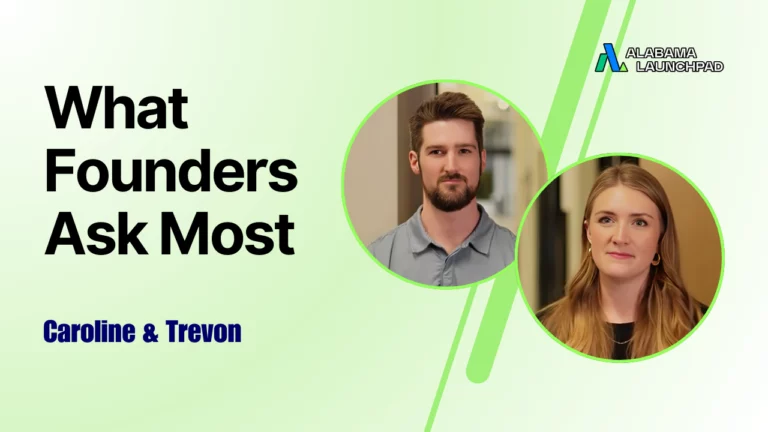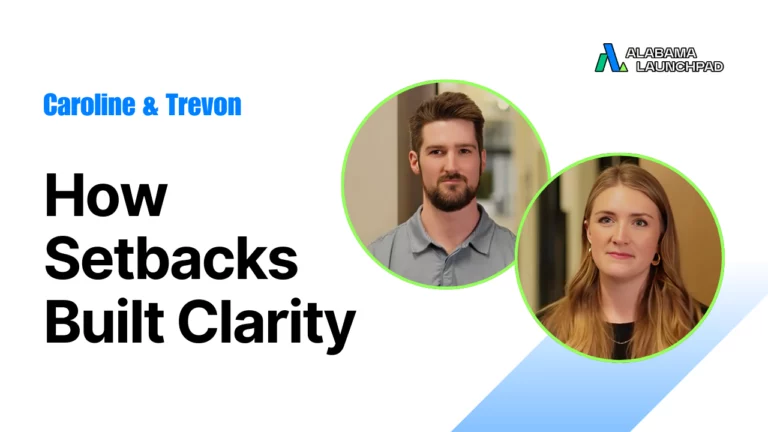
Startup competitions may capture headlines, but they rarely create lasting businesses. As Ryan Robinett explains, Launchpad’s true value lies not in checks or prizes but in helping founders build sustainable companies. Founders in Launchpad gain structure, practical skills across sales, HR, marketing, and finance, and a powerful advisor network that continues long after the pitch competition ends. Instead of pushing rivalry, Launchpad fosters collaboration—so that every founder leaves stronger, regardless of whether they win prize money. For decision-makers evaluating accelerator programs, Launchpad represents an investment in durability and long-term outcomes, not just short-term excitement.
Key Points
Startup competitions aren’t enough to sustain a business
Winning $50,000 or even $100,000 doesn’t matter if a founder can’t build a company that generates real revenue or attracts follow-on funding.

Founders need skills in sales, HR, marketing, and finance
Launchpad ensures entrepreneurs leave with the core business knowledge necessary to sustain and scale.

Collaboration drives real progress more than rivalry
Instead of promoting Shark Tank–style competition, Launchpad cultivates shared learning and peer support.

The advisor network is Launchpad’s long-term value
Relationships with advisors and alumni continue beyond the program, creating a support system for ongoing growth.

“Winning $50,000, $100,000, whatever it is—if you can’t bring your company to market, whether you drive revenue, whether you raise the next round of money, you’re just delaying the process of getting a real job. That’s where Launchpad does a really good job of helping the founders build foundational aspects to their company.”
– Ryan Robinett
The Limits of Startup Competitions
Startup competitions are exciting, but they can also be misleading. As Ryan Robinett notes, a check—whether $50,000 or $100,000—doesn’t guarantee a founder’s future. “If you can’t bring your company to market, whether you drive revenue, whether you raise the next round of money, you’re just delaying the process of getting a real job.” Prize money might buy time, but it doesn’t teach the skills or provide the network needed to sustain a company.
Building Foundational Business Skills
Launchpad’s focus is on equipping founders with practical, cross-functional skills. Regardless of vertical—life sciences, consumer goods, or tech—every entrepreneur must navigate marketing, HR, sales, and finance. The accelerator provides structured training and advisory support in these areas, ensuring that participants gain durable tools to guide them through the challenges of growth.
Collaboration Over Rivalry
Too much of startup culture has been shaped by a competitive narrative, fueled by shows like Shark Tank. Robinett critiques this approach, pointing out that “we don’t collaborate enough, we compete.” Launchpad takes a different path, fostering an ecosystem where founders share resources, learn from one another, and collectively raise the odds of success. This collaborative approach makes every participant stronger, not just the ones who win at demo day.
The Advisor and Alumni Network Advantage
One of Launchpad’s biggest differentiators is its advisor network. Founders don’t just receive guidance during the program—they stay connected long afterward. Robinett highlights this ongoing value: “What LaunchPad does through the advisory services is it helps founders build the network that allows us to stay in touch long after the process is done.” Alumni connections and advisor relationships provide ongoing mentorship and opportunities that extend far beyond prize checks.
Sustaining Success Beyond Prize Winnings
For decision-makers considering where to invest their startup’s limited time and energy, Launchpad offers a compelling case: long-term sustainability over short-term wins. Founders leave the program with foundational skills, deep networks, and the collaborative mindset necessary to scale. Prize money becomes a bonus, not the measure of success.
FAQ
How is Launchpad different from traditional startup competitions?
Unlike pitch competitions that focus on prize money, Launchpad prioritizes skill development, advisory support, and collaboration. Founders leave with tools to build a sustainable business, not just temporary funding.
What skills do founders gain through Launchpad?
Founders gain essential expertise in sales, HR, finance, and marketing. These areas are critical for long-term success and are often overlooked in competition-driven environments.
Does Launchpad still offer pitch competitions?
Yes, pitch competitions are part of Launchpad, but they’re not the centerpiece. The structure ensures a more level playing field within industry verticals, while still emphasizing collaboration and shared growth.
Why does Launchpad value collaboration over competition?
Robinett explains that startup culture often leans too heavily on rivalry, but true progress comes from shared learning. Launchpad builds a culture where founders collaborate, share advice, and grow stronger together.
What happens after the program ends?
The advisor network and alumni community remain active. Founders continue to receive guidance and maintain relationships long after they graduate, giving them ongoing support to navigate new challenges.
Connect With Launchpad
As Ryan Robinett emphasizes, Launchpad is about more than competitions—it’s about building resilient founders and sustainable companies. To learn how Launchpad can help your business thrive beyond the pitch stage, connect with the Launchpad team today.







